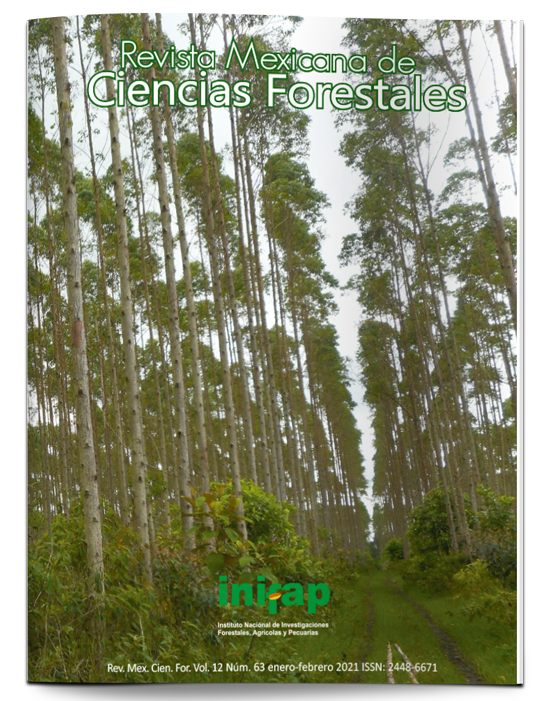Efecto del intemperismo y biodeterioro en compuestos plástico-madera (CPM) elaborados con borato de zinc
DOI:
https://doi.org/10.29298/rmcf.v12i63.801Palabras clave:
Biodeterioro, compuesto plástico-madera, intemperismo, propiedades físicas, propiedades mecánicas, pudriciones fúngicasResumen
Se evaluaron las propiedades físicas y mecánicas de compuestos plásticos de madera (CPM) elaborados con borato de zinc (BZ) y sometidos a tratamientos de intemperismo y biodeterioro. Se utilizaron concentraciones de BZ al 0, 1, 3 y 5 %; harina de madera de pino, malla 60 y polipropileno, en proporciones de 50/48, 50/47, 50/45 y 50/43, en función de la concentración de BZ. En todos los CPM, se adicionó 2 % de anhídrido maleico de polipropileno (MAPP) como agente acoplante. Los CPM se expusieron al intemperismo natural durante 6 meses y al biodeterioro con Gleophyllum trabeum (pudrición parda) y Trametes versicolor (pudrición blanca) mediante pruebas de agar (EN 350-1) y bloque suelo (ASTM D 2017-05). Se evaluaron las propiedades físicas de absorción e hinchamiento y las mecánicas de flexión estática, resistencia a la tracción y resistencia al impacto. Además de la alteración de la luminosidad y caracterización morfológica con microscopía electrónica de barrido (SEM). El borato de zinc no tuvo efecto en las propiedades mecánicas de los CPM sin tratamientos. Después del intemperismo, el BZ no incidió sobre la flexión estática y resistencia al impacto; aunque, se observó un efecto positivo en la resistencia a la tracción. En CPM expuestos a la biodegradación por hongos, el BZ influyó positivamente en la resistencia al impacto. Independiente de las bajas tasas de descomposición, el BZ fue eficaz contra la descomposición fúngica; las pérdidas de peso de los CPM expuestos en pruebas de agar y bloque de suelo no mostraron diferencias significativas.
Descargas
Descargas
Publicado
Cómo citar
Número
Sección
Licencia
Los autores que publiquen en la Revista Mexicana de Ciencias Forestales aceptan las siguientes condiciones:
De acuerdo con la legislación de derechos de autor, la Revista Mexicana de Ciencias Forestales reconoce y respeta el derecho moral de los autores, así como la titularidad del derecho patrimonial, el cual será cedido a la revista para su difusión en acceso abierto.
Todos los textos publicados por la Revista Mexicana de Ciencias Forestales –sin excepción– se distribuyen amparados bajo la licenciaCreative Commons 4.0 Atribución-No Comercial (CC BY-NC 4.0 Internacional), que permite a terceros utilizar lo publicado siempre que mencionen la autoría del trabajo y a la primera publicación en esta revista. (no permite el uso comercial)
Los autores pueden realizar otros acuerdos contractuales independientes y adicionales para la distribución no exclusiva de la versión del artículo publicado en la Revista Mexicana de Ciencias Forestales (por ejemplo, incluirlo en un repositorio institucional o darlo a conocer en otros medios en papel o electrónicos) siempre que indique clara y explícitamente que el trabajo se publicó por primera vez en la Revista Mexicana de Ciencias Forestales.
Para todo lo anterior, los autores deben remitir el formato de carta-cesión de la propiedad de los derechos de la primera publicación debidamente requisitado y firmado por los autores/as. Este formato debe ser remitido en archivo PDF al correo: editorial.forestal@inifap.gob.mx
Esta obra está bajo una licencia de Creative Commons Reconocimiento-No Comercial 4.0 Internacional.






